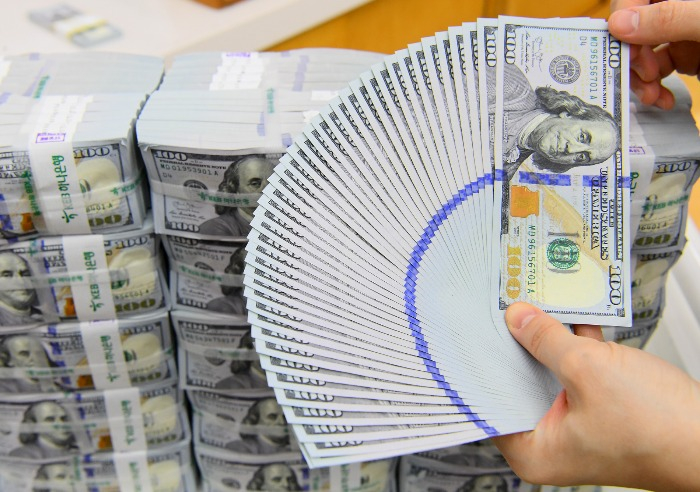Foreign exchange
Hedge funds’ speculative trade blamed for won’s drop: Dealers
The won is likely to weaken further to test the 1,400 threshold against the dollar
By Sep 13, 2022 (Gmt+09:00)
2
Min read
Most Read
LG Chem to sell water filter business to Glenwood PE for $692 million


KT&G eyes overseas M&A after rejecting activist fund's offer


Mirae Asset to be named Korea Post’s core real estate fund operator


StockX in merger talks with Naver’s online reseller Kream


Meritz backs half of ex-manager’s $210 mn hedge fund



Global hedge funds’ bet on further weakness in the won is blamed for the accelerated decline in the South Korean currency value against the dollar, according to foreign exchange dealers on Monday.
Multiple hedge funds, including the US-based Bridgewater Associates, are understood to have sold the won in offshore non-deliverable forward (NDF) markets, in which they would buy it back in the coming months at agreed-upon rates.
Bridgewater is the world’s largest hedge fund, led by billionaire investor Ray Dalio and with assets under management of $140 billion.
The won has been on a downward run to hit its lowest level since the financial crisis. It has been the worst performer among emerging Asian currencies so far this year.
In response to the rapid decline in the won, Finance Minister Choo Kyung-ho on Aug. 23 ramped up a verbal intervention, warning against “speculative trade" in offshore foreign exchange markets.
“The government will stay on alert to an increase in speculative trade in offshore markets aimed at taking advantage of the dollar’s global strength and will step up our monitoring against the move.”
His remarks came shortly after the won softened to 1,345 per dollar on Aug. 23, its weakest level since early 2009. On Tuesday, the won opened lower and was quoted at 1,375 per dollar in domestic trade.
Since the increased level of verbal intervention, however, global hedge funds have been spotted to take short positions in sporadic trade in NDF markets, dealers said.
NDF markets are usually used to hedge against foreign investors’ exposure to the won after they convert dollars into won for the purpose of investing in South Korea. But recently, a volume of speculative trade has occurred in these markets, they noted.
“South Korea is among the world’s top 10 foreign exchange markets, alongside Australia, and has a market sizeable enough to make profits from foreign exchange trade,” one of the dealers said.
“Thanks to South Korea's robust fundamentals, it will be able to defend against one or two attacks from speculative traders.”
The won is the 10th most widely traded global currency.
To curb speculative trade in the won and reduce market volatility, the finance ministry is working on new measures with a view of opening the door of the domestic foreign exchange market to overseas financial institutions.
Currently, only domestic banks and securities are allowed to participate in the Korean forex market.
But the country will continue to keep foreign investors from engaging in spot trade in offshore currency markets, which policymakers cautioned could leave the won more vulnerable to speculative trade.
“If the new measures are introduced, we expect that the local foreign exchange market will not be moved by a few institutions,” said a finance ministry official.
Write to Jung-Hwan Hwang and Mi-Hyun Cho at jung@hankyung.com
Yeonhee Kim edited this article.
More to Read
-
 Shipping & ShipbuildingHanwha Ocean shares sink after KDB's sale of 4.2% stake
Shipping & ShipbuildingHanwha Ocean shares sink after KDB's sale of 4.2% stakeApr 29, 2025 (Gmt+09:00)
-
 EnergySouth Korea nears Czech nuclear deal; Doosan, related stocks fly high
EnergySouth Korea nears Czech nuclear deal; Doosan, related stocks fly highApr 25, 2025 (Gmt+09:00)
-

-
 Business & PoliticsSeoul, Washington agree on July tariff deal framework in '2+2' trade talks
Business & PoliticsSeoul, Washington agree on July tariff deal framework in '2+2' trade talksApr 25, 2025 (Gmt+09:00)
-

Comment 0
LOG IN


